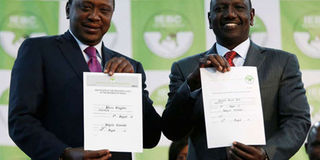Some urgent items in the full tray for this new government

Incumbent President Uhuru Kenyatta and Deputy President William Ruto hold their certificates after Kenyatta was announced winner of the presidential election at the IEBC National Tallying centre at the Bomas of Kenya, in Nairobi. PHOTO | THOMAS MUKOYA | REUTERS
What you need to know:
The government is not even through the first quarter of its financial year and it has incurred huge expenses or losses from running the election, to maize subsidies and the foregoing of tariffs on selected food imports.
Then there is the cost of extra deployment of police and their overtime.
The public wage bill rose by 48.3 per cent between July last year and March this year alone due to a variety of pay awards to civil servants: teachers, lecturers and police.
The rise in food imports together with the waiver on some tariffs and the subsidy of maize is a triple-pronged burden on the country’s current account and the beleaguered Exchequer.
Much had been said and promised in the run-up to the elections.
It was a fiercely fought campaign with a generous dose of unrealistic and often foolish promises.
Indeed, the economic backdrop to this election was a very unenviable one: Three deficient rains seasons in succession and an extensive drought; an inexorable rise in the price of basics, food, especially, which went hand in hand with inflation. Most Kenyans have experienced a serious dent in their standards of living.
As if this was not daunting enough the country is now being subjected to post-election fluidity, which is creating uncertainty.
There is arguably nothing worse for an economy with such a scenario. In 2007 economic growth exceeded six per cent.
It dropped to less than one per cent in 2008 as a result of elections and post-election violence and chaos.
JUDICIARY
If one puts that together with the problems already being faced then the outlook for the rest of this year is a very tough one.
Already, growth had dropped to less than five per cent due to contrarious weather, such negatives as the interest rate capping legislation and uncertainties related to the election run up.
What is taking place now will harden that downward trend. So how is this going to play out in the coming months? What are the indicators to watch?
The IEBC has been sorely tested. In all fairness it was an onerous task given the numbers and the capacity needed.
But its overall performance fell below par and there are still a number of unanswered questions.
Many eyes will be on the Judiciary in the next few months. Arguably, the main challenge will be capacity, but equity and impartiality will also be key factors.
There are also other big issues. Inordinate quantities of money were spent. Is election spending legislation going to be swept under the carpet again?
CHALLENGES
Some of the most burning challenges will be financial and economic.
The government is not even through the first quarter of its financial year and it has incurred huge expenses or losses from running the election, to maize subsidies and the foregoing of tariffs on selected food imports.
Then there is the cost of extra deployment of police and their overtime. Let us go through a few random figures.
The public wage bill rose by 48.3 per cent between July last year and March this year alone due to a variety of pay awards to civil servants: teachers, lecturers and police.
The public wage bill gobbles up half of the government tax receipts, leaving a wafer-thin layer of money to cover the many goods and services such as education and basic health.
Then in May came an 18 per cent increment in the minimum wage.
The rise in food imports together with the waiver on some tariffs and the subsidy of maize is a triple-pronged burden on the country’s current account and the beleaguered Exchequer.
MAIZE IMPORTS
And it will continue. Sizeable maize imports will be required until November and 150,000 tonnes of sugar is to be imported. The maize subsidy scheme is likely to continue until a reasonable crop hits the market. Then we have the deep undercurrent of inequality and disparity in wealth. Eleven million Kenyans are living below the poverty line. That is over a fifth of the population.
The talk of using scarce government resources more efficiently and effectively must be walked. The same applies to serious resolve to tackle corruption.
The frequent references to Kenya being a land of a few “haves” in a sea of “have nots” must go.
Prudent, cost effective projects driven by the need for inclusivity are a yes. More concentration on the vital, but a less glamorous task of making basic services more efficient and accessible is also a big yes.
Extravaganzas such as the costly Syokimau to Miritini SGR must not be repeated.
President Uhuru Kenyatta and his team have a golden opportunity to learn from the past.
That means learning from both the mistakes and successes, taking stock and moving forward.
Mr Shaw is a public policy and economic analyst: [email protected]





